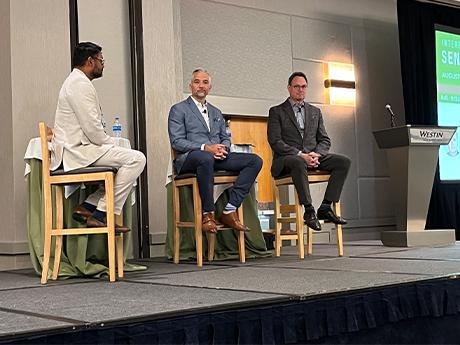ATLANTA — Today’s seniors housing market is a tough one, characterized by an inflationary environment and high operational costs. Amid the challenges the industry currently faces, owner-operators within the sector must focus on controlling expenses, such as labor and insurance, to maintain profitability — and earlier is better when it comes to planning to mitigate these expenses.
Eric Mendelsohn, CEO and president of National Health Investors, a REIT that specializes in seniors housing, emphasized the importance of labor market analysis in the underwriting stage of operations.
“Labor is a key element of expense structure in the building,” he said. “Before, we could give it a cursory look. Now, it’s important to really drill down into a market.
“We pay closer attention to labor expense and availability. We’ll see what our competitors are paying, and then see what other industries such as retail and fast food in the area are paying. If Target and TGI Fridays are unable to find labor, that’s an indicator that you’re going to have a problem.”
Mendelsohn’s remark came during the keynote address at the 10th annual InterFace Seniors Housing Southeast, a networking and information conference hosted by France Media’s InterFace Conference Group and Seniors Housing Business. The event was held on Wednesday, Aug. 16 at the Westin Buckhead hotel in Atlanta.
Aaron D’Costa, executive vice president of sales and marketing for EyeWatch LIVE, a tech company that provides video monitoring technology to seniors housing communities, moderated the panel. In addition to Mendelsohn, the panel included Chris Guay, founder and CEO of Vitality Living, a Nashville, Tennessee-based provider of independent living, assisted living and memory care.
Guay affirmed Mendelsohn’s statement, noting that underwriting and acquisition teams at Vitality Living work closely to understand the entire labor market. “Post-COVID, we diagnose labor as deeply as we used to diagnose resident demographics,” he explained.
“The other thing we’re doing with our properties is that we’re figuring out all the details with insurance a lot earlier in the process,” Guay added. “Insurance and tax rates are extremely high, so we’re being a lot more proactive and aggressive than we have in the past. We think that leads to a much better outcome for the community.”
Both speakers discussed strategies to address high insurance premiums, including creating a group policy for a pool of 200 buildings to spread risk and lower costs.
“If you have three buildings in a hurricane zone or an earthquake zone, spreading [insurance premiums] out over a larger group can make a big difference in terms of your policy premium,” said Mendelsohn.
Ultimately, the panel stressed that efficiency is the name of the game, in today’s tough market. Investing in infrastructure and building strong, fast processes — both when it comes to managing the community and in the back office — is crucial to maintain growth.
“Operators are looking for ways to control expenses and optimize efficiency,” said Mendelsohn. “Some are even experimenting with automation. I know one operator that installed a refrigerated automat to serve food — such as sandwiches and cookies — to residents. At first, I was skeptical, but when you see it, it’s very efficient. I thought it was ingenious.”
“You’ve got to make sure you can put your money where your mouth is,” added Guay. “How do we get more efficient? Can we get more efficient through innovation and technology? Are there things that can help us be more efficient with staffing, like robot servers? It’s important to start thinking about how to run your business in the most effective way.”
— Channing Hamilton

